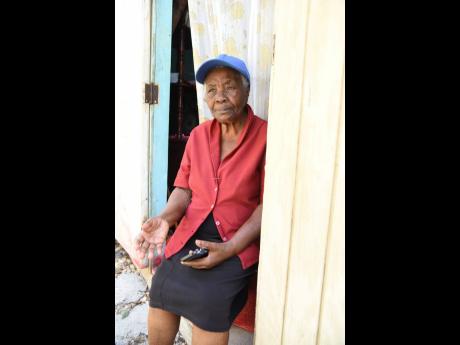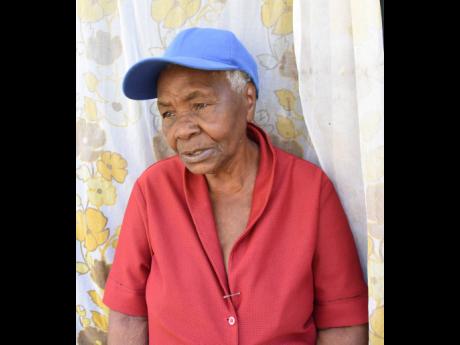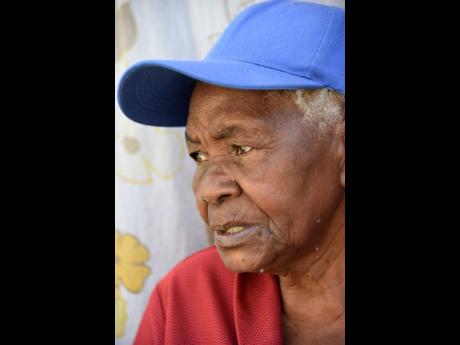‘He was in here like a roaring lion’
Elderly woman in fear living with schizophrenic son
At 90 years old, Merline McIntosh says she can no longer look after her mentally ill son, who was recently released into her care after 17 months in custody on charges which were dropped.
The 48-year-old man was diagnosed with schizophrenia 30 years ago, and McIntosh said he has been in and out of mental institutions and on medication since. All this time, she was his only caregiver, and would ensure he took his medication and visited the health centres.
But in October 2021, while off his medication, he was arrested and charged with breaking and entering a home in their Duhaney Park community in St Andrew.
After months of silence, she received a call last Thursday that he would be returning home because the claimants had dropped the case against him, and was told that he needed to visit the mental health community care centre.
“I said, ‘No, I cannot manage him. I am 90 years old and I cannot manage him, and I don’t have anybody to help me, … but they send him same way,” McIntosh said.
“When mi see him a di gate, mi ‘fraid because him two eye coming outta him head,” she said about his return last Friday.
By Saturday, the man was involved in a machete-swinging altercation with a neighbour and had locked his mother out of her house.
“He was in here like a roaring lion. Everybody fraid fi him,” the still-terrified McIntosh recalled in an interview with The Gleaner.
The elderly woman, who suffers from hypertension and diabetes, said some residents managed to restrain him, and the police were called. They took him to the Kingston Public Hospital, where he is currently being treated.
But McIntosh is worried about what will happen once he is released yet again.
“I just don’t know what to do because I know that they are not going to keep him in Public. As soon as him calm down, they’re going to send him back and they (residents) don’t want him here, and I can’t live with him,” she said. “I cannot live with him any more. I am afraid. I was not [always] afraid of my child, but I am so scared [now]. I just don’t know what to do,” she said before breaking into tears.
Her neighbour, Oshane Cole, told The Gleaner that he is anxious about her safety.
“At her age, she is old. From him come back, she is not the normal [person] she was; she is totally disturbed,” he said. “Being here all by herself along with him, no one knows what can happen.”
McIntosh doubts that he was being treated while in remand.
“I don’t know what they do down deh to him, whether they give him medicine or not. Because I don’t believe if he was getting treatment, he would come back in that condition,” she said.
Forensic psychiatric expert Dr Myo Kyaw Oo told The Gleaner that mentally ill persons who are remanded are assessed by psychiatrists and given appropriate medication.
However, he lamented the conditions of prisons and lock-ups as they are not ideal for such persons.
“You can imagine, when the mentally ill are sent to police lock-ups or the prison system, ... they need treatment. These places are not therapeutic environments at all,” he said.
He said that in the past, mentally ill persons who committed crimes were sent to the Bellevue Hospital’s forensic psychiatric ward, but this was destroyed by fire 48 years ago.
Since then, people admitted at the governor general’s pleasure were transported to the Tower Street Adult Correctional Centre.
But Oo, who is the senior medical officer at the Bellevue Hospital, believes a special facility should be created for such persons.
“My dream always has been [and] I’d like to see a forensic psychiatric hospital. Once we have a forensic psychiatric hospital, that is the hospital where all the people can be housed … . Mentally ill people need to get humane treatment so they can be treated in place with dignity and their rights should be well respected,” he told The Gleaner.
Professor Wendel Abel, consultant psychiatrist at The University of the West Indies, Mona, while indicating his willingness to assist McIntosh, said help is also available at the nearest community health centre.
He pointed out that the caregiver of a mentally ill person can be relieved of care if they are no longer able to financially or physically take care of the person.
“That is why you need to go to community care and they will make an assessment and see how you can be engaged,” he said, adding that a mentally ill person could be moved to a shelter or the Bellevue Hospital.
How to get help
If you or someone you know is in need of mental health intervention, call or visit your nearest community health centre to speak with a community mental health aide.



